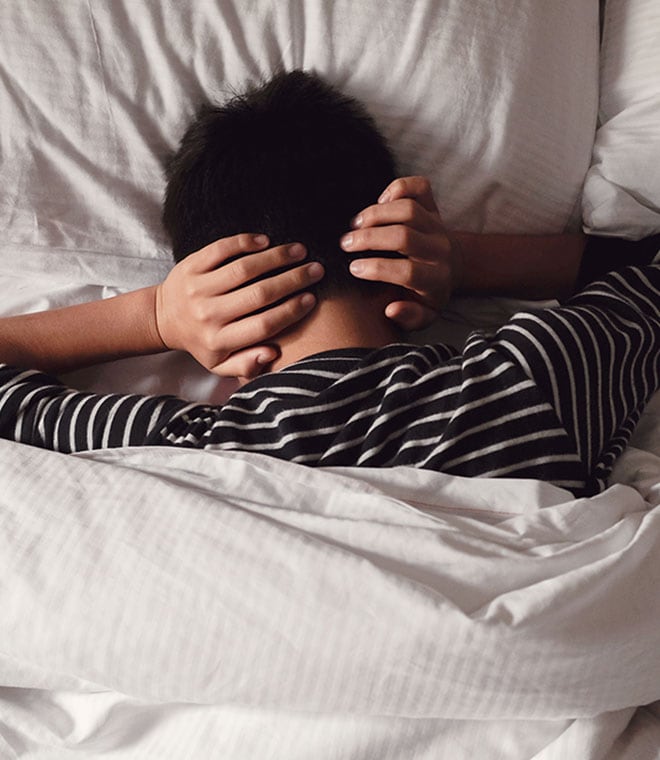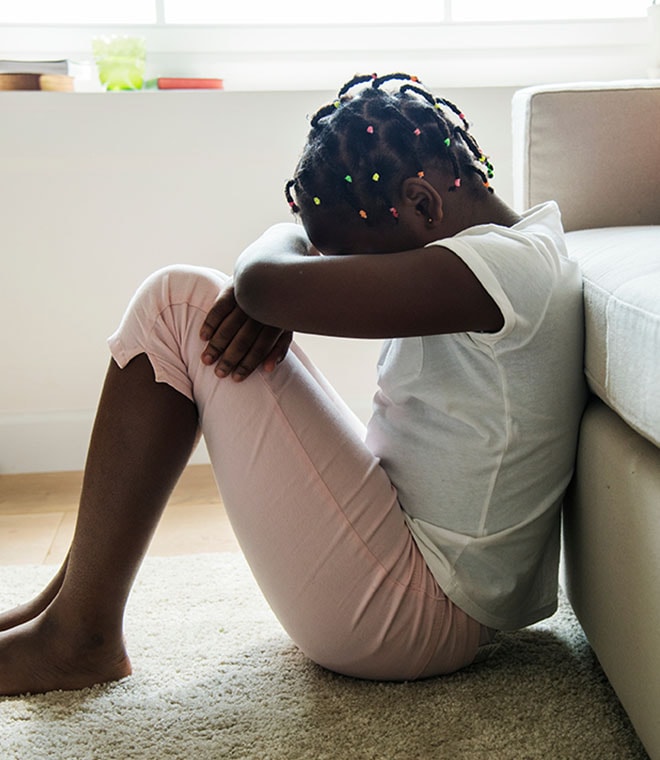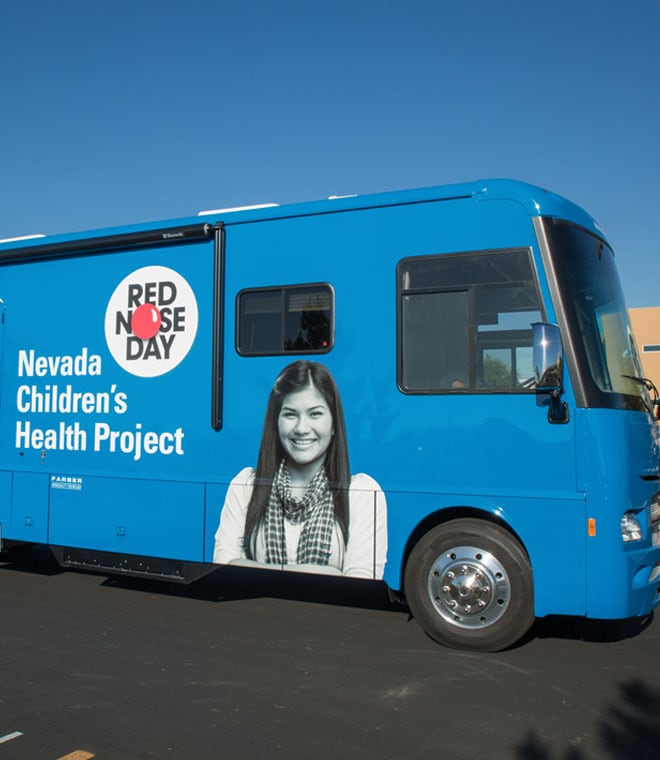Health
Children's depression and treatment
By Rebecca Thomas, RN, BSN, CPHQ Nov 19, 2024 • 12 min
Depression is often used as a broad term with many different meanings related to sadness. Clinically, the term depression (also known as major depressive disorder) describes a common but serious mood disorder that can negatively affect a person's thoughts, behavior and feelings. Depression can cause someone to feel sadness and experience a loss of interest in things they once enjoyed. This can lead to different emotional and physical problems, and it can make it difficult for someone to function well at work, school and home.
Depression commonly affects children and adolescents as well as adults. In 2021, an estimated 5 million adolescents in the U.S., ages 12 to 17, had at least one major depressive episode. This represents 20.1% of youth in this age range. More adolescent females (29.2%) experience a major depressive episode compared to adolescent males (11.5%). Additionally, almost 3.7 million adolescents (14.7%) in the same age group had at least one major depressive episode and were impaired enough to significantly impact their chores at home, school, work, family relationships or social life.
A major depressive episode lasts two weeks or longer, during which the child or adolescent experiences a depressed mood, a loss of interest or pleasure in daily activities, and at least five other symptoms that reflect a change in function, such as problems with sleeping, eating, energy, concentration, indecisiveness, self-image or recurrent thoughts of death or suicide.
Persistent depressive disorder (dysthymia) is a milder, chronic state of feeling depressed or irritable most of the time for at least one year in addition to two or more of the major depressive episode symptoms, as mentioned above.
Signs of depression in children
The symptoms of depression in children may vary from those in adults, especially since feeling sad at times is a normal part of growing up. When describing how they feel, some children may deny feeling sad, but will admit to feeling down, irritable or just not enjoying themselves as they did before. Some of the more common symptoms a parent may notice in their child or adolescent include spending less time with friends or in after-school activities, feeling like everything is their fault or they are not good at anything, caring less about school, and often feeling tearful. Children may also describe feeling more physical symptoms, such as frequent headaches and stomach aches.
It is important to talk to your child about what is going on in their daily lives and ask if there is anything bothering them, as a number of outside factors can lead to depression, including losing someone close to them, bullying, school demands or even spending too much time using social media. Some depressed children or adolescents may even have feelings of wanting to hurt themselves, in which case immediate medical care is needed.
Parents should not try to treat their child's depression on their own. If you think your child or adolescent is depressed or see signs that concern you, promptly seek help from a professional, such as a pediatrician, school counselor or mental health professional. Depressed children often don't recognize they are depressed and may need help identifying changes in mood and activities. The sooner you can seek help, the better. Your child’s healthcare provider can also diagnose any other conditions that may be present or increasing your child’s risk of developing depression, such as learning issues, conduct or anxiety disorders.
Should your depressed child take medication?
Before considering any medication for depression, a child or adolescent should be carefully and thoroughly evaluated by a medical provider, such as a psychiatrist specialized in treating children and adolescents or a pediatrician experienced in the treatment of mood disorders in this age group. A thorough assessment will help determine an accurate diagnosis and the most appropriate treatment plan for the child. While most children who take antidepressants will improve with medication, combining medication with talk therapy (counseling) may also further improve depression symptoms.
Although there has been a concern that antidepressant medication may encourage suicidal behavior or thoughts in children and young adults, newer research indicates that the benefits of these medications likely outweigh the risks versus leaving the depression untreated. It is important to speak with your child’s medical provider about all treatment options. In addition, children who are prescribed medication should receive close, ongoing medical monitoring. Once treatment has started, medication should not be discontinued without consulting their provider first.
Therapy types for children with depression
Psychological therapies for depression in children and adolescents include a number of approaches that may help with problem-solving, communication skills, processing different emotions and possible trauma. These therapies may include:
- Cognitive behavioral therapy (CBT)
- Interpersonal therapy (IPT)
- Acceptance and commitment therapy (ACT)
- Counseling/school counseling
- Play therapy
- Animal-assisted therapy
- Creative arts therapy
How can you help your child with depression?
There are several things you can do to help a child struggling with depression, including:
- Providing an environment where your child feels safe talking about their feelings and about things going on in their daily lives, such as school, sports and friendships
- Promoting a healthy lifestyle, such as eating well, exercising, having a regular sleep schedule and seeking fun activities with friends to promote positive connections with others
- Limiting screen time and spending quality time with them
- Praising good behavior and their strengths, as this can help promote self-esteem
- Fostering a space of safety and security to speak openly about bullying, grief or loss, and letting them know that you are there to support them through the challenges they may face as children/adolescents
- Listening and acknowledging their struggles and feelings
Children of depressed parents
When parents have depression or another mental health condition, their children are at higher risk of depression or other mental health conditions themselves. If you experience any of the following symptoms, seek professional help:
- Loss of interest in normal activities and hobbies
- Difficulty thinking, concentrating, or making decisions, as well as forgetfulness
- Feeling sad, hopeless, irritable or guilty
- Changes in eating and weight
- Feeling too exhausted to complete even small tasks
- Excessive anxiety or worry
- Continued self-blame for past mistakes or failures
- Physical pain, such as headaches and muscle tension
- Thoughts of suicide or self-harm
If you or a loved one is experiencing thoughts of suicide or self-harm, call, text, or chat with the 988 Suicide & Crisis Lifeline 24/7, 365 days a year. It’s important for parents to take care of their own mental health so that they can help their children thrive.
Finding the right therapist for your child
If your child or adolescent shows signs of depression, getting timely professional help and treatment is essential. Finding a therapist or counselor that your child connects with, trusts, and who is the right fit for your family may take some time.
You can learn about different kinds of mental health therapy, video chat live with a therapist for an initial consultation, or visit the National Alliance on Mental Health (NAMI), to help you navigate mental health resources for your child.
Updated by Julie McDaniel, MSN, RN, CRNI, November 2024.
Sources:
- https://psychiatry.org/patients-families/depression/what-is-depression
- https://www.nimh.nih.gov/health/statistics/major-depression
- https://www.ncbi.nlm.nih.gov/sites/books/NBK35129/table/A58167/
- https://www.aacap.org/AACAP/Families_and_Youth/Facts_for_Families/FFF-Guide/The-Depressed-Child-004.aspx
- https://www.uptodate.com/contents/depression-treatment-options-for-children-and-adolescents-beyond-the-basics/print
- https://www.healthychildren.org/English/health-issues/conditions/emotional-problems/Pages/Childhood-Depression-What-Parents-Can-Do-To-Help.aspx.
- https://www.merckmanuals.com/professional/pediatrics/psychiatric-disorders-in-children-and-adolescents/depressive-disorders-in-children-and-adolescents#Symptoms-and-Signs_v43476216
- https://www.uptodate.com/contents/overview-of-prevention-and-treatment-for-pediatric-depression
- https://mcpress.mayoclinic.org/parenting/what-kind-of-therapy-is-right-for-my-child/
- https://www.psychiatry.org/patients-families/psychotherapy
- https://www.nami.org/depression-disorders/5-things-you-can-do-to-help-your-child-with-depression/
- https://www.hhs.gov/about/news/2024/08/28/us-surgeon-general-issues-advisory-mental-health-well-being-parents.html
- https://www.psychiatry.org/patients-families/depression/what-is-depression
- https://www.nimh.nih.gov/health/topics/depression
- https://988lifeline.org/



